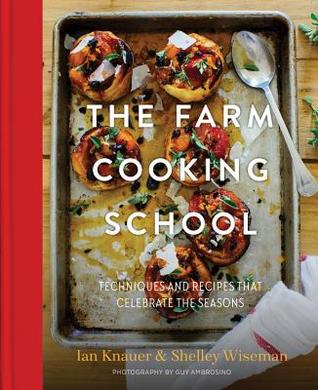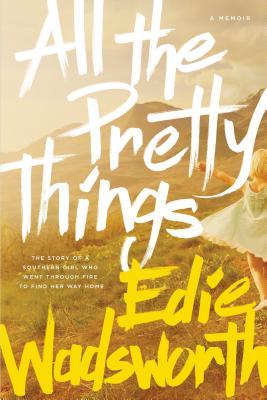All the Pretty Things by Edie Wadsworth
The Glass Castle is one of my all-time favorite books, so I should have known I was getting set up for disappointment when this one is compared to The Glass Castle on the front cover - just like every book that claimed to be the next Gone Girl. All the Pretty Things is Edie Wadsworth's story of growing up dirt poor in Appalachia and how she managed to climb out of the poverty and become a doctor against all odds, but that success didn't make her life instantly perfect. Her father and most of his family were terrible alcoholics who spent their money on alcohol instead or rent or food. Many of her family members were in and out of jail and many died young due to drug and alcohol abuse. Edie, her sister, and cousin were all molested by the same family member as well. Church and her relationship with God were life rafts in Edie's chaotic life growing up, but it wasn't until she was already working as a doctor, married with small kids that her past really caught up with her and she finally addressed her childhood in therapy. She was also finally able to allow God to heal some of her family wounds. While her story is remarkable, the book wasn't as great as it could have been. The first half is very detailed, but once she's in college time passes more quickly in the book and it's hard to figure out what's going on sometimes. Also, I found it VERY odd that she called her sister Gina "Sister" and that's what her mother called her. It just seemed odd and was kind of off-putting while you're reading. And while I understand not wanting to have too much TMI - it seems like there was a lot that was left out or implied that could have really added to the story. Overall, it was OK, but not great and definitely not as good as I was hoping for.
One quote I did really like:
"I learned that we all have wounds, and we can either open them up to the light of day so they can heal or we can keep them buried, where they will fester and one day wreak havoc on us." (p. 244)
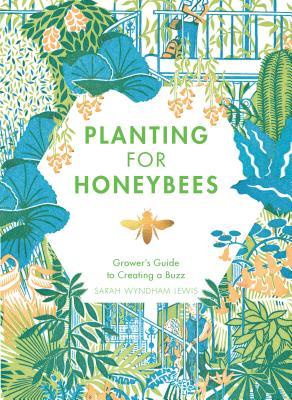
Planting for Honeybees: the grower's guide to creating a buzz by Sarah Wyndham-Lewis
This is a very easy to read guide for planting for honeybees. The author talks about why planting for honeybees is important, the history of humans and honeybees, what bees get from these plants, recommended plants, facts about honeybees, and further resources. I really like that in the chapter on "planting recommendations" she breaks it down from windowsill gardens, patios, and all the way to large gardens. She even covers rooftop gardens and "living walls." She also then further breaks down the suggested plants by season (when they would be in bloom for the bees). It's a very pretty book too with lots of beautiful illustrations. This could be a great book to own and refer back to over time as you want to add more or have the opportunity for a larger garden space. The only downside is that the author is from the UK, so all the resources she recommends are in or from the UK. I would just be sure if you're in the US that you make sure the flower/plant recommendations would work in your geographic area.
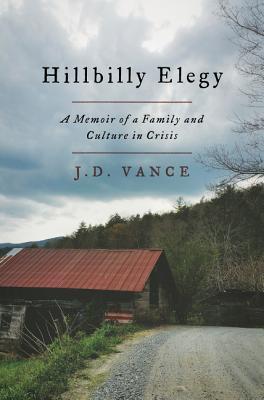
Hillbilly Elegy: a memoir of a family and culture in crisis by J.D. Vance (Books & Banter book club)
The Vance family was from Kentucky's Appalachia region and his grandparents moved to Ohio to try to escape the poverty all around them. While his grandparents did achieve middle-class status, his family struggled to escape the hillbilly in all of them - the legacy of abuse, alcoholism, poverty, and trauma. Even though J.D. would go on to college and Yale Law School, he struggled with his background and how it limited him socially and since he had never seen a healthy marriage when he was dating his now-wife he didn't know who to deal with conflict at all. J.D.'s story is powerful in that he shows the environment and mentality he grew up in and how that shaped his life, but also speaks to the larger issues of the poor, white, working class people. There is no easy policy answer to fix generations of poverty and abuse, but J.D. proves that because of a few key people in his life he was able to overcome the limitations of his hillbilly background. This book is eye-opening and very well written. I can't wait to see what J.D. writes next.
Some quotes I liked:
"One of our neighbors was a lifetime welfare recipient, but in between asking my grandmother to borrow her car or offering to trade food stamps for cash at a premium, she'd blather on about the importance of industriousness. 'So many people abuse the system, it's impossible for the hardworking people to get the help they need,' she'd say. This was the construct she'd built in her head: Most of the beneficiaries of the system were extravagant moochers, but she - despite never having worked in her life - was an obvious exception." (p. 55)
"[In school] I often felt sick and would complain of severe stomachaches to the school nurse. Though I didn't realize it at the time, the trauma at home was clearly affecting my health. 'Elementary students may show signs of distress through somatic complaints such as stomachaches, headaches, and pains,' reads one resource for school administrators who deal with children who suffer trauma at home...Mom and Bob weren't that abnormal. It would be tough to chronicle all the outbursts and screaming matches I witnessed that had nothing to do with my family...Seeing people insult, scream, and sometimes physically fight was just a part of our life. After a while, you didn't even notice it. I always thought it was how adults spoke to each one another." (p. 72-3)
"Papaw was a terrifying hillbilly made for a different time and place. During that cross-country trip with Aunt Wee, they stopped at a highway rest stop in the early morning. Aunt Wee decided to comb her hair and brush her teeth and thus spent more time in the ladies' room that Papaw thought reasonable. He kicked open the door holding a loaded revolver, like a character in a Liam Neeson movie. He was sure, he explained, that she was being raped by some pervert." (p. 108)
"One Sunday, Mamaw agreed to watch Aunt Wee's kids for several hours...I had to work the dreaded eleven A.M. to eight P.M. shift at the grocery store...I wanted nothing more than to spend the day with Mamaw and the babies. I told Mamaw that, and instead of telling me to 'quit your damn whining' like I expected, she told me she wished that I could stay home, too. It was a rare moment of empathy. 'But if you want the sort of work where you can spend the weekends with your family, you've got to go to college and make something of yourself.' That was the essence of Mamaw's genius. She didn't just preach and cuss and demand. She showed me what was possible - a peaceful Sunday afternoon with the people I loved - and made sure I knew how to get there." (p. 149)
"Every time the drill instructor screamed at me and I stood proudly; every time I thought I'd fall behind during a run and kept up; every time I learned to do something I thought impossible, like climb the rope, I came a little closer to believing in myself. Psychologists call it 'learned helplessness' when a person believes, as I did during my youth, that the choices I made had no effect on the outcomes of my life. From Middletown's world of small expectations to the constant chaos of our home, life had taught me that I had no control. Mamaw and Papaw had saved me from succumbing entirely to that notion, and the Marine Corps broke new ground. If I had learned helplessness at home, the Marines were teaching learned willfulness." (p. 163)
Other memorable scenes too long to quote here:
pages 33-34 where J.D. describes his grandparents destroying and threatening a store employee at a drug store when the employee was "rude" to their oldest child.
pages 75-77 when J.D. Mother tries to kill him while driving and he runs to a stranger's house where the police are called.
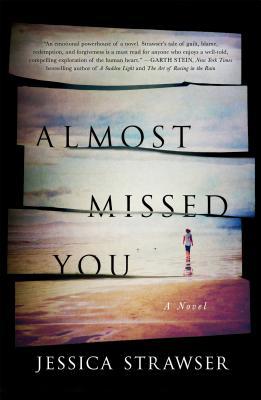
Almost Missed You by Jessica Strawser
** spoiler alert ** I love a good disappearance story, so I was excited to read this book. The premise is that on a family beach vacation Violet comes back to their hotel room and finds that her husband Finn has taken their son Bear and disappeared. She is completely blindsided and never saw this coming. As the days pass Violet struggles to remember any detail of their life together that could have been a red flag, but she can't find anything. As secrets come to the surface, Violet discovers she never really knew Finn, but was their connection real or another secret? Told from Violet, Finn, and their good friend Caitlin's points of view and going back and forth in time the story and all the secrets unfold.
This book was great in the first few chapters, but then it REALLY went downhill. Finn had no social media or online presence, which seems weird since he worked in graphic design. So, you're thinking there's some terrible secret he's hiding or something from his past that could come back to threaten him - nope. He's just super fucked up because he fell asleep at the wheel and killed his fiancee - the fiancee he met when he was trying to find Violet after they had a chance meeting on the beach while they were both on vacation in Florida. So, his guilt about his fiancee's death leads to him feeling guilty about being happy with Violet and Bear, so he kidnaps his son to punish them all more? WTF?! This is the WORST disappearance storyline EVER! Then at the very end it hints at a reconnection between Finn and Violet - are you the stupidest woman in the entire world?! The ending was so terrible and really like something out of a Lifetime TV movie. This could have been a great book, but it was a huge disappointment.

Libertarians on the Prarie: Laura Ingalls Wilder, Rose Wilder Lane, and the making of the Little House Books by Christine Woodside
I wasn't sure what to expect with this book, but it was very eye-opening. I loved the Little House on the Prarie books when I was a kid and I've read a few other things about Laura Ingalls Wilder as an adult. But, I did not know before reading this book just how much Rose "helped" her mother write the Little House books. Rose Wilder Lane was a published author in her own right and before the Little House books she had "borrowed" some of her mother's stories for her own fiction. Rose realized that her mother's stories had the potential to be a money-maker during the Depression, so she started encouraging her to write down her stories, but she then very heavily edited and added to the stories. In the first 4 books Laura always had the final say, but the last 3 were much more Rose's work based on her mother's stories. While this doesn't change how I feel about the books as part of my childhood, it is very interesting that this was hidden for so long. It was also interesting to read about how after Rose's death her close friend Roger MacBride REALLY took the Little House series to the next level with the TV show, merchandise, and even more books. It was also somewhat surprising that Laura and Rose had such a strained relationship. It seems like Laura was really close with her own father and wanted to write the stories to honor him, but she was not close at all with Rose. Rose also just seemed very unhappy overall and was constantly complaining in her diaries about EVERYTHING. Overall, it was a unique look at how the Little House books came to be and how they were influenced and also were influential.
Some quotes I liked:
"Rose the writer lauds stoicism, financial discipline, and repression of desire. Yet in her own life she ignored some of the key lessons that the stern adults had given her by remaining in debt and subcontracting the simple chores of daily living." (p. 86-7)
"...in October 1936, Rose wrote an article for Ladies' Home Journal under the title, 'Woman's Place is in the Home' that, while ostensibly looking back on her own life, once again celebrated values that had nothing to do with how she had actually lived...In these lines Rose seems to mourn her choices. She ends by advising women to be creative at home - cooking, decorating, nursing, gardening, and understanding the arts. There are the words of a person with regrets - or, possibly, of a writer who'd say anything to make some money." (p. 97-8)
"Roger MacBride also understood the financial value of Laura and Rose's stories. His actions between 1968, when Rose died, and his own death in 1995, transformed one beloved book series into an enterprise: television show, spinoff titles, and countless other products." (p. 177)

Strays: a lost cat, a homeless man, and their journey across America by Britt Collins
This is such a sweet and heart-breaking story! Michael King is homeless and sleeping in a UPS loading bay in Portland, Oregon. One night he finds and injured and under-weight cat and stops to help her. Feeling like this is definitely someone's pet he posts on Craigslist and tries to find the owner, but after several weeks he becomes attached to Tabor, as he know calls her, and they start out on the road to leave Portland's winter behind for the warmer southern California. Tabor seems born for the road she's very laid back and learns to walk on a leash. Michael's usual MO was to panhandle for money to get wasted every night, but once he has Tabor with him he scales back his usual drinking to watch out for her. They travel together for 10 months before Michael's foster father convinces him to have Tabor checked out at a vet - that's when the vet finds Tabor's microchip and finds out that she was reported missing by her owner Ron. Now Michael has to decide whether to do the right thing and take Tabor back home or keep the cat that has changed his life. Told from both Michael and Ron's perspectives, this tearjerker story will warm your heart. Anyone who's ever had pets will be able to relate to this beautiful story. Honestly, I'm still not sure Tabor going back to Ron was the truly "right" thing in this case because by the end of the book Michael still seems deeply affected by his time with Tabor and truly in need of that bond. Wonderful story, but be prepared to possibly cry at the end!

The Foundling: the true story of a kidnapping, a family secret, and my search for the real me by Paul Joseph Fronczak
Paul Fronczak never felt like he fit into his family. His brother looked like their Dad, but Paul didn't. He was the oldest, but his brother had the larger, better bedroom. Then when Paul was 10 he found a box of documents about a stolen child who was returned to the family almost 2 years later. His mother admitted that when he was born someone posing as a nurse stole him from the hospital, but he was found and returned to them. As an adult, Paul decided to start searching to see if he was really the found child - a DNA test proved he wasn't biologically related to his parents. This starts a multi-year search for his own identity and what really happened to the real Paul Fronczak. While his story is definitely interesting, I didn't love the writing and there was a lot of technical detail about DNA matching and family trees that I didn't really interest me. Once Paul finds out about his birth family it's not a happy story - he had a twin who most everyone believes was killed and he was abandoned to cover up whatever happened to his twin. His family of origin was not nice, VERY dysfunctional, and often violent. A cousin that he finds tells him, "...Paul, let me tell you this. The best thing that ever happened to you in the world was when they left you out in front of that store." (p. 231) The search for his identity and what happened to the real Paul consumed Paul's life - his brother cut off all contact with him, he and his wife separated, and the biological siblings he did find also suddenly cut off all contact with him as well. He found out all the information, but it didn't really help him - he kind of ruined the life he already had. And you still don't know what happened to his twin or the real Paul. Definitely an interesting premise, but not a great outcome to the story.
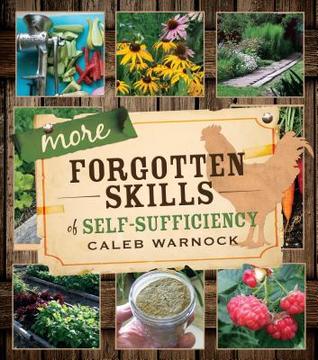
More Forgotten Skills of Self-Sufficiency by Caleb Warnock
A friend recommended this book and it does have a lot of information to offer. Warnock's main point is that there are so many skills of self-sufficiency that our grandparents or great-grandparent's knew that are being lost. While these skills may not be necessary today with technology, but they are very good to know and can save you a lot of money. And if you're growing and/or raising your own food you never need to worry about food recalls. It's a very easy to read book, but my main complaint is how he comes across - he's Mormon and seems to assume that you'll have a stay-at-home-mom or multiple kids in the picture to help run your back-in-time household. He does talk about doing what you can, but I didn't love the feel of the book. But, there is a lot of good information if you're interested in doing more for yourself. I also really liked his idea of people offering "backyard classes" to teach the skills they know or have learned. Overall, a good book with a lot of good information.
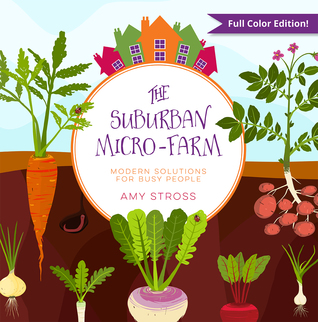
The Suburban Micro-Farm by Amy Stross
Amy Stross shows how you can use a small suburban house lot to grow much of your own food. She grows 50% of her own food on their 1/10 acre lot! I really like how she shows that there are so many options for growing at least some of your own food. I was surprised that she didn't mention HOAs because that's the biggest issue for suburban gardening today. The pictures of her house with veggies and herbs in the front yard would not be allowed in many neighborhoods. But, she also talks about going to farmers markets and joining a CSA or community garden. The majority of the book talks about varieties of vegetables, fruit, and herbs you can grow almost year round in your yard. There were a few examples, but she mentions some spreadsheets and checklists that she's created that are on her website that I'd definitely like to check out. Overall, a really helpful book if you're interested in turning your lawn into a vegetable and herb garden.
Some quotes I really liked:
"An Ohio State University study discovered that the city of Cleveland, Ohio, could produce almost 100% of its needs for fruits, vegetables, chicken eggs, and honey by using vacant lots, commercial and industrial rooftops, and just 9% of each residential property for growing gardens, raising chickens, or keeping bees." (p. 14)
[Victory gardens during WWII] "At their peak in 1944, 20 million garden plots produced 40% of all produce consumed in the United States." (p. 15)

Give A Girl A Knife by Amy Thielen
I love a good cooking memoir, but this one was pretty disappointing. The first section was pretty good giving the author's background and how she and her boyfriend were living off the grid before deciding to move to New York City for her to go to culinary school and him to focus on his artwork. But, the later sections in the book basically went into more detail of her childhood and just seemed out of place. The very last section is the most current with Amy and her husband expecting a baby and still going between their now more on-grid house in Minnesota and NYC. It just seemed like a pretty jumbled book with random stories thrown around throughout. Also, there were things that she would mention that seem important (like her husband's brother dying in a plane crash), but then there was never more detail about that which seemed odd. Overall, I didn't love it and I wouldn't recommend it.
